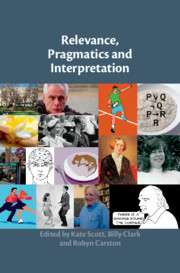Book contents
- Relevance, Pragmatics and Interpretation
- Relevance, Pragmatics and InterpretationEssays in Honour of Deirdre Wilson
- Copyright page
- Contents
- Contributors
- Cover Acknowledgements
- Introduction
- Reflections on the Development of Relevance Theory
- Part I Relevance Theory and Cognitive Communicative Issues
- Part II Pragmatics and Linguistic Issues
- 8 Mood and the Analysis of Imperative Sentences
- 9 The Korean Sentence-Final Suffix ci as a Metarepresentational Marker
- 10 Expressive Epithets and Expressive Small Clauses
- 11 Ad Hoc Concepts, Polysemy and the Lexicon
- 12 The Polysemy of a Norwegian Modal Adverb
- 13 Noun-Noun Compounds from the Perspective of Relevance Theory
- 14 Procedural Syntax
- Part III Figurative Language and Layered Interpretations
- References
- Author Index
- Subject Index
13 - Noun-Noun Compounds from the Perspective of Relevance Theory
from Part II - Pragmatics and Linguistic Issues
Published online by Cambridge University Press: 08 July 2019
- Relevance, Pragmatics and Interpretation
- Relevance, Pragmatics and InterpretationEssays in Honour of Deirdre Wilson
- Copyright page
- Contents
- Contributors
- Cover Acknowledgements
- Introduction
- Reflections on the Development of Relevance Theory
- Part I Relevance Theory and Cognitive Communicative Issues
- Part II Pragmatics and Linguistic Issues
- 8 Mood and the Analysis of Imperative Sentences
- 9 The Korean Sentence-Final Suffix ci as a Metarepresentational Marker
- 10 Expressive Epithets and Expressive Small Clauses
- 11 Ad Hoc Concepts, Polysemy and the Lexicon
- 12 The Polysemy of a Norwegian Modal Adverb
- 13 Noun-Noun Compounds from the Perspective of Relevance Theory
- 14 Procedural Syntax
- Part III Figurative Language and Layered Interpretations
- References
- Author Index
- Subject Index
Summary
Anne Bezuidenhout shows how the meaning of noun-noun compounds cannot be predicted by linguistic rules but must allow for a component of context-specific relevance-based inference. She reviews several approaches which attempt to provide semantic and/or statistical (bigram frequency-based) accounts of the meaning of compounds but finds none of these fully adequate.She concludes that such accounts inevitably have to be supplemented by local pragmatic processes of concept narrowing and broadening (ad hoc concept construction) such as those developed within the relevance-theoretic framework.
Keywords
- Type
- Chapter
- Information
- Relevance, Pragmatics and Interpretation , pp. 174 - 186Publisher: Cambridge University PressPrint publication year: 2019
- 4
- Cited by

